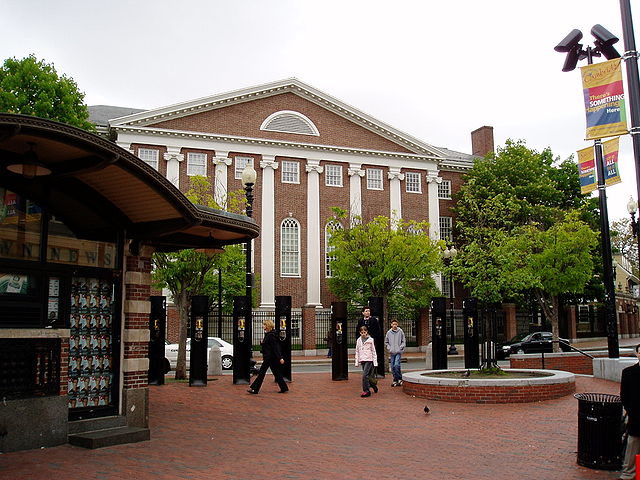Is Harvard Profiting From California’s Drought?
The university is buying up vineyards and their valuable water rights. Harvard Square in Cambridge, Mass. (muns / Wikimedia Commons)
Harvard Square in Cambridge, Mass. (muns / Wikimedia Commons)
Harvard University has the world’s largest endowment, valued at $39.2 billion in 2018, according to The New York Times. That asset allows the university to take some surprising turns in its investments, including, starting in 2012, buying up vineyards in the drought-stricken region of Paso Robles, Calif., and the increasingly valuable water rights that come with them.
As The Wall Street Journal reported Monday, Harvard, through its endowment management company, “was acquiring rights to vast sources of water in a region where the earth’s warming is making the resource an ever-more-valuable asset.”
California’s Central Valley has suffered from a drought since 2011. Farmers in the region have resorted to obtaining water from ancient aquifers, an increasingly scarce resource that is expensive to access. The Journal points out that water has always been scarce in California, but “[c]limate change is making the situation worse, scientists and state officials say.” The region’s groundwater basin, it says, “was once celebrated as one of the largest freshwater aquifers west of the Mississippi River, but the level in certain wells had fallen significantly.”
To some, it seems that in betting on grapes, the university was also betting against climate change. Either way, the Journal reports, “Harvard’s bet has proven prescient.”
It appeared that way even in 2015, when Reuters reported that Harvard had “quietly become one of the biggest grape growers in California’s drought-stricken Paso Robles wine region.” Reuters also noted that, according to documents it reviewed, “[Harvard Management Co.] got permits for seven 800-foot wells on Aug. 21, 2013, six days before a ban on new pumping from the hardest-hit part of the basin took effect.”
There was nothing illegal about the purchases, but they raised concerns among activists, Reuters reported. Susan Harvey, of North County Watch, an environmental advocacy group, wondered, “Is Harvard going to keep pumping groundwater, or cut back on returns to protect water quality and quantity?”
Three years later, the returns continue to be large. The Journal reports that the endowment “now values its vineyards at $305 million, up nearly threefold from in 2013, while its overall natural-resources investments have done poorly.”
The investment “has also earned backlash from some farmers and other locals who fear Harvard eventually will use up groundwater and unduly influence water-use regulations.”
Some locals are particularly worried about the secrecy behind the land deals and Harvard’s use of limited liability companies, also known as LLCs, to make the purchases. In a letter to Harvard Management Co., Cindy Steinbeck, a vineyard owner in the area, wrote that the use of subsidiaries “seems designed to obfuscate Harvard’s activities in the area.”
Harvard responded that the investments were “purely agricultural in nature.”
At least one member of Harvard’s board of overseers, Kat Taylor—an environmentalist and wife of billionaire Democratic donor Tom Steyer—has resigned over the vineyard purchases. Harvard’s California investments “may, in the short run, be about developing vineyard property,” she told the Journal. “In the long run, it was a claim on water.”
Read the entire Wall Street Journal article here.
Your support matters…
Independent journalism is under threat and overshadowed by heavily funded mainstream media.
You can help level the playing field. Become a member.
Your tax-deductible contribution keeps us digging beneath the headlines to give you thought-provoking, investigative reporting and analysis that unearths what's really happening- without compromise.
Give today to support our courageous, independent journalists.









You need to be a supporter to comment.
There are currently no responses to this article.
Be the first to respond.